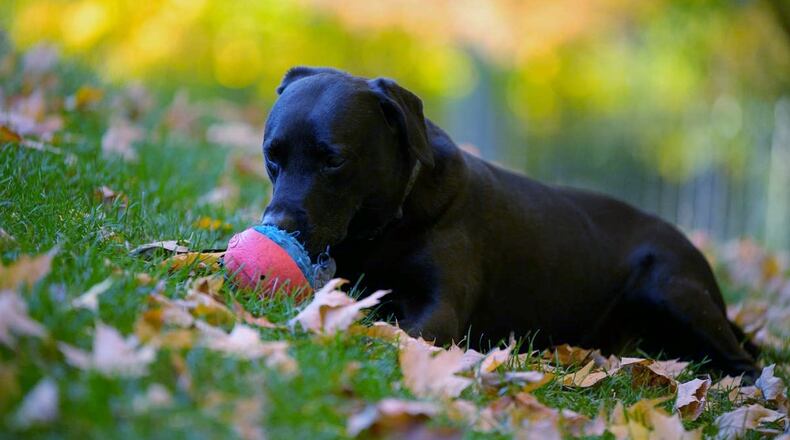As I exited my bedroom last Sunday, I thought about the morning ritual I have with Teddy, my family’s 10 year-old Lab. He was waiting for me.
Teddy followed me into the kitchen and patiently stood there as I grabbed the Jiff peanut butter, a colorful light blue melamine dessert plate and two paper napkins from the pantry. I placed my items on the counter next to the toaster and took a muffin from the bread drawer. Teddy watched as I moved to the refrigerator, where I grabbed the honey butter and strawberry jam before heading back to the toaster. I split open the muffin and popped it in.
As the muffin was toasting, I headed toward the cupboard where Teddy was sitting and opened the door. I took out one of his Cosequin tablets, dipped it in his own jar of Jiff and handed it to him. As he quickly gobbled it, I got one of his toothbrushes. Normally, he and I head over toward the dining room. I tell him to sit and wait with both verbal and nonverbal commands. I then throw the toothbrush toward the study. Teddy waits until I give him the command, “Go!”
Teddy springs toward the toothbrush and I head to the living room. Whoever makes it to the coffee table first “wins.” Of course, Teddy always wins. The Lab chews up the dental treat, his reward. We’ve been playing this game for years.
But on this Sunday, my thoughts were not on the game or any type of routine, for that matter. I had a multitude of small items on my to-do list and playing the toothbrush game didn’t make the list. I didn’t tell Teddy to sit or wait. I simply handed the toothbrush to the plush black Lab.
The pooch stood there for a few moments and looked at me as if I had lost my marbles. To my amazement, Teddy thrust his head in the air and threw the dental brush up.
I quickly picked it up and said, “I’m sorry, I didn’t do that right, did I? I’m calling do-overs.”
I swear Teddy knew what I was saying because he sat down beside me and waited for me to throw his toothbrush.
This time I did.
Jessicas Kim writing for the dogster.com, echoes Patterdale’s explanations: “Routines can help your dog understand that all its needs will be met daily. Not only does this reduce anxiety and stress, but it also establishes trust and strengthens the bond between owners and their dogs.”
Many experts believe a simple game like the one Teddy and I play every morning reminds him of the different but familiar places in our home. This is one of many small but important games, moving in and out of four rooms, to keep his brain sharp.
Any age dog can enjoy learning new tricks. But for Teddy and his older-aged buddies, these new tricks can help keep their minds nimble. Just make sure they are appropriate for your dog’s physical abilities.
Now, when I’m giving a treat to Teddy, I place the treat in front of him where he can easily see it and I say, “Wait.” I then count out loud to five. I finish off with, “OK,” and Teddy snaps up his treat. It’s a simple and easy trick for any dog. Teddy now knows there is a “task” he must complete before he gets a treat.
Keeping your dog’s normal daily routines is important. Daily meals, walks, naps, play time and bathroom breaks need to stay the same. Each activity may need to be adjusted to fit your dog’s aging, but it’s the “routine” that is invaluable.
For example, Teddy’s bathroom routine starts as the first task each morning. He has two more, one in the late morning and one after dinner. The Lab’s last bathroom break is before going to bed at night. The tired pooch always goes at night because he knows my husband Ed, his fearless leader, has two cheese cubes waiting for him. Again, another routine.
I leave Teddy’s cupcake tin game out to play with him daily instead of a couple of times a week. Ed has started to ask Teddy to shake his hand before giving him a treat from the container in his desk drawer.
Granted, these are tiny changes in Teddy’s routine, but they are beneficial to his overall happy environment.
Karin Spicer is a member of the Dog Writers Association of America and the Cat Writers Association. She can be reached at spicerkarin@gmail.com.
Reasons a dog should have a routine:
1. Essential for his well‑being.
2. Dogs benefit from the clarity and consistency.
3. Reduces anxiety and improves behavior.
About the Author

